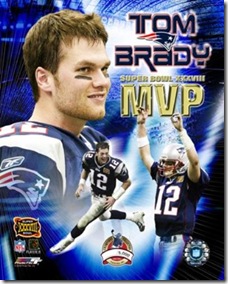No One Remembers Shockdome

Originally intended as a UV bit, but then it got long.
As you've probably heard, Bill Belichick went for a first down on fourth and two from his 29 with about two minutes left and his team leading by six points. The Patriots didn't get it, the Colts made the short march for the game-winning score, and commentators duly exploded at how awful the decision was. Tony Dungy evidently kept saying Belichick "should have gone with the percentages."
He did. Of course he did, he's Bill Belichick:
With 2:00 left and the Colts with only one timeout, a successful conversion wins the game for all practical purposes. A 4th and 2 conversion would be successful 60% of the time. Historically, in a situation with 2:00 left and needing a TD to either win or tie, teams get the TD 53% of the time from that field position. The total WP for the 4th down conversion attempt would be:
(0.60 * 1) + (0.40 * (1-0.53)) = 0.79 WP
A punt from the 28 typically nets 38 yards, starting the Colts at their own 34. Teams historically get the TD 30% of the time in that situation. So the punt gives the Pats about a 0.70 WP.
This is obvious in retrospect, right? Bill Belichick is one of the greatest coaches in the history of the NFL. There is a slight chance he knows what he's doing. And even if you are one of the folk who really believes emotion and momentum overwhelm probability in football, not even broaching the idea that Belichick might be on to something is simultaneously stupid and arrogant—neat trick. If you are a caveman when it comes to football and see Belichick go for it there, your first thought should be "hmmm… maybe I don't know something." This, obviously, has not happened. Caveman status is self-perpetuating.
Big Ten Wonk's civilian alter-ego notes that Joe Posnanski may have disagreed with the decision but at least showed Belichick—and math—respect by mentioning the percentages:
Really, no matter how you play with the numbers, it will come out about the same. Try it. There is almost no way–without suppressing the numbers–to make the percentages even out. The Patriots’ best PERCENTAGE chance was to go for it on fourth down. Of course, football is not really a percentage game for most of us, is it? No, it’s a game about emotion and passion and momentum.
This is where Posnanski needs to play a lot of poker. Emotion and passion and momentum are great for football players. For coaches they are ways to go on tilt and make dumb decisions that are safe but go against the percentages. Belichick is ruthless and in a position where media criticism means nothing as far as his job goes. Most other NFL coaches would take the safe route and decrease their chances of winning because they perceive that it would increase their chances of keeping their job.
But, you know, at least Posnanski brought it up. Many thousands didn't, and just did some blah blah about how it was dumb, thereby implying they were smarter than Bill Belichick. This is why he is the traditional journalist who's bridged the internet divide more successfully than any other. Clark Wonk:
In other words, ”traditional sports punditry” is denoted not by what kind of resume you have, how old you are, whether you sit in the press box, or even whether your thoughts are packaged in 800 words of ink, 1600 words of pixels, or two minutes of streaming video. No, “traditional sports punditry” denotes merely that you’re not staying current within your own field: “What the hell is Belichick doing?” as opposed to “Whoa, talk about trusting the percentages–what the hell is Belichick doing?” …
To be aware of what Posnanski calls the “PERCENTAGE”s, ones that indicate that probability was in Belichick’s favor over the course of a thousand tries, does not rule out disagreeing with the coach in this single instance. But to not be aware of these percentages is to fail in the most basic journalistic sense. To write about a decision, much less try to criticize it, without displaying any understanding of its self-evident context is to fall down on the job in the ”why” department, even if you do get the who, the what, the when, and the where.
Humans would be well-advised to nail the “why,” by the way. Computers can now do those other four pretty well.
Seriously. Does anyone remember SHOCKDOME XXXVI*? The Patriots get the ball back in a tie game with about two minutes left. Tom Brady is the Patriot's first-year starting quarterback. John Madden, embodiment of conventional wisdom-type substance, is publicly begging Belichick to run the clock out and head to overtime instead of putting the game on the kid's shoulders. Belichick says screw that noise, I've seen Tom Brady play football, let's go, and two minutes later Adam Vinateri is kicking a game-winning field goal and no one remembers the ballsy decision that won the damn game. The reason Belichick is so untouchable that he can defy conventional wisdom is because he defied conventional wisdom.
And yet no one mentions this.
*(AKA Super Bowl XXXVI. An aging Pat Summerall awkwardly blurted out "this game has turned into Shockdome 36" at some point in the second quarter when the Patriots weren't getting stomped like everyone expected they would, and I died laughing.)
November 17th, 2009 at 2:31 PM ^
November 17th, 2009 at 5:27 PM ^
November 17th, 2009 at 12:41 PM ^
November 17th, 2009 at 12:44 PM ^
November 17th, 2009 at 12:44 PM ^
November 17th, 2009 at 12:53 PM ^
November 17th, 2009 at 1:06 PM ^
November 17th, 2009 at 1:32 PM ^
November 17th, 2009 at 1:49 PM ^
November 17th, 2009 at 1:54 PM ^
November 17th, 2009 at 1:02 PM ^
November 17th, 2009 at 1:10 PM ^
November 17th, 2009 at 1:31 PM ^
If you are a caveman when it comes to football and see Belichick go for it there, your first thought should be "hmmm… maybe I don't know something." This, obviously, has not happened. Caveman status is self-perpetuating.makes me think of my favorite paper in Psychology: "Unskilled and Unaware of It: How Difficulties in Recognizing One's Own Incompetence Lead to Inflated Self-Assessments:" http://www.apa.org/journals/features/psp7761121.pdf
November 17th, 2009 at 1:41 PM ^
November 17th, 2009 at 1:59 PM ^
November 18th, 2009 at 12:43 AM ^
November 17th, 2009 at 6:10 PM ^
November 17th, 2009 at 9:59 PM ^
November 18th, 2009 at 10:09 AM ^


Comments